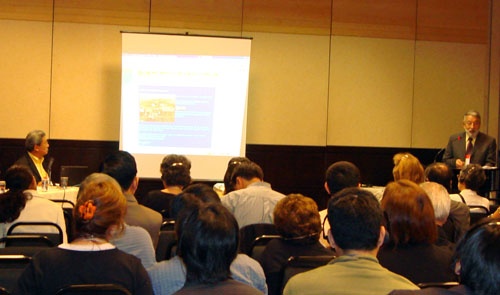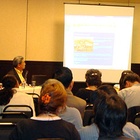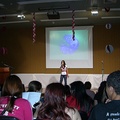Between July 18–21, 2007, the Joint Convention of the 14th Pan-American Nikkei Convention (COPANI) and the 48th Convention of Nikkei and Japanese Abroad (Kaigai Nikkeijin Taikai ) was held in the city of São Paulo. The event – whose main topic was “The Nikkei Contributions to Society in the Progress of Society” – brought together hundreds of participants from eleven countries in the Americas (Argentina, Brazil, Canada, Chile, Colombia, Mexico, Paraguay, Peru, United States, Uruguay, and Venezuela) in addition to two countries in Asia (Japan and Indonesia).
The main lectures and panel discussions took place on July 19, but the program was quite diverse, including a reception by the Consul General of Japan and a trip to the city of Registro, one of the landmarks of Japanese immigration to Brazil. The weekend program featured a visit to the Center of Immigrant Exhibitions to see the 10th Japanese Festival, an annual event organized by the Brazilian Nikkei community. The festival has become well known in Brazil, at one point attracting nearly 400,000 visitors.
The discussions were held at 13 panels composed of a diverse group of professionals (doctors, lawyers, businesspeople, dentists) and focused on various themes (Youth, Women in Society, Nikkei in the Military, Japanese Culture and Language, History of Japanese Immigration, Employment in Japan, Dual Nationality, Japanese Music, Nikkei Writers’ Cultural Exchange).
The Discover Nikkei project was directly involved in the organization of the workshop about the History of Japanese Immigration, along with affiliates from Argentina, Brazil, and Chile.
In the morning, the discussions focused on the legacy of Japanese immigration throughout the Americas by using the Nikkei Album online tool. (See Nikkei Album colllections: Nikkeis Emprendedores en la Argentina , Os imigrantes japoneses percursores - Um olhar histórico sobre o período Pré-Kasato-Maru , Chile y la inmigración japonesa ) In the various panels, one could notice not only the differences among the Nikkei groups in regard to their adaptation to the culture of their respective countries, but also the similarities – e.g., their goal of financial success. Panelists explained that Japanese immigrants had to work hard and that they suffered much prejudice in the post-World War II period. As time went on, they began to achieve respectability in their communities as individuals and businesses because of their reliability. Another key point of interest for the Nikkei was the importance of education. They took great pains to enroll their children in grade school; later on their descendents were able to enter university.
Lunchtime was another special occasion, as it allowed participants from various countries to get to know one another and exchange experiences.
In the afternoon, numerous themes were discussed, among them:
- - The identity crisis of the Nikkei, a result of, for instance, the fact that they’re seen as foreigners in Japan and as Japanese in the countries where they were born.
- - Miscegenation among the Nikkei, for with the increase of interethnic marriages the question about the future of the Japanese race becomes inevitable.
- - The formation of youth groups composed of descendents of Japanese immigrants in search of both their roots and the creation of their own identities.
In her lecture, Dr. Akemi, from California, showed a photograph of ethnically mixed people – blacks, Japanese, white Americans – explaining that this is probably one example of future Nikkei families. In other words, miscegenation will become more frequent with the passage of time.
The convention was an excellent opportunity to discover that in different countries with different customs and languages, the Nikkei – even at this moment of transition and transformation – should maintain ties with Japan.
* Associação Brasileira de Estudos Japoneses (ABEJ), affiliated with Discover Nikkei, contributed this article to Discover Nikkei. ABEJ is a non-profit organization composed of professors and researchers in various fields of study about Japan, in addition to specialists, students, and others interested in Japanese issues.
© 2008 Alexandre Ratsuo Uehara and Mary Maruyama







